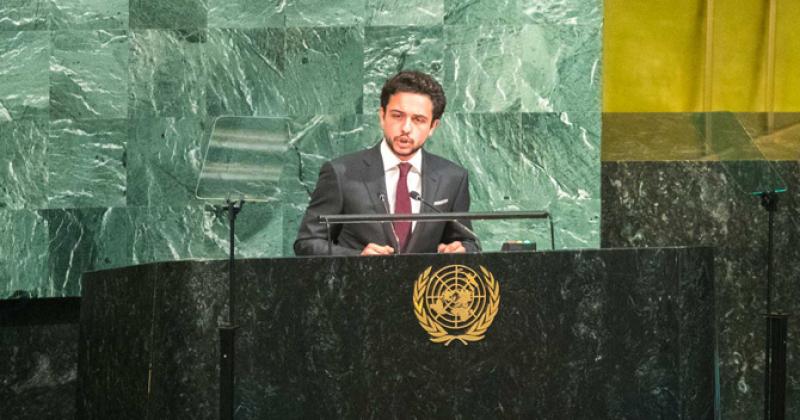Crown Prince Hussein bin Abdullah mounted the podium of the world’s biggest stage to address the UN General Assembly, speaking not only on behalf of his “beloved Jordan” and as representative of His Majesty King Abdullah, “but also as a member of the greatest generation of young people in history”.
By any standard, and as overwhelmingly regarded by the most credible observers both at and outside of the United Nations, Prince Hussein’s UN statement was powerful, responsible, courageous, honest, accurate, comprehensive and focused, instantly receiving well-deserved international acclaim.
He eloquently highlighted many of the global challenges and boldly diagnosed the flaws of the international system, as well as the disastrous consequences of prevailing misguided polices.
It was a well-crafted, highly polished and awe-inspiring speech in which he pressed important messages that resounded throughout the world.
This is not the Prince’s first influential UN experience. Two years ago, Prince Hussein was the youngest person ever to chair a formal session at the UN Security Council, the session that led to the “unanimous adoption of Resolution 2250 on Youth, Peace and Security, aimed at empowering young people to participate in peace processes and dispute resolution”, a message which we were reminded of in the Prince’s General Assembly speech last Thursday.
This time as the young Jordanian leader addressed the entire General Assembly at its major annual session that addresses issues of a much wider scope, his address was characterised by marked comprehensiveness and depth.
In his brief but very precise statement, the Prince presented a host of vital issues and highlighted the many challenges faced by youth of his generation in their struggle to reconcile the wisdom and values they inherited from their elders “with our reality today”, which “is unprecedented” and where “our hyper-connected world is at once bringing people closer together and widening the divisions between them”.
The Prince added: “We are at the brink of a fourth industrial revolution, which is redefining how we function as societies and how we relate to one another as human beings.”
This certainly is true, and whereas adaptation to previous industrial revolutions were performed in relatively more stable situations, the current, and much more complex, situation is likely to be far more difficult to handle due to the surrounding uncertainties, misguided strategies, loss of direction and unrestricted rapacity.
In accordance with the UN tradition, Prince Hussein’s speech was supposed to remain within the confines of issues concerning Jordanians, and that objective was indeed fully delivered.
However, and in a similar manner, Prince Hussein addressed a host of other crucial issues of global significance.
He reminded the audience of the disasters our world is straining under, the confused priorities of our decision-making apparatuses and the moral crises that are fast invading our values and threatening our peace, indeed our very existence.
But while explicitly presenting the Jordanian situation, the challenges resulting from the many regional conflicts all around, the mounting burdens, the economic crises and the border closures, the Prince left no doubt in anyone’s mind that Jordan remains strong, loyal to its humanitarian missions and peace-keeping tasks worldwide, resilient, and determined to pursue a steady course of reform and advancement.
He also emphasised the commitment to establishing Jordan as a launching pad for global peace and stability.
But Jordan, a country that has endured many external shocks, more than many other countries, and yet has made a large contribution to global peace and security, as the Prince explained, cannot do it all alone.
“No doubt Jordan is regularly praised for its humanitarian and moral stance, and we are proud of our country’s reputation,” the Crown Prince said, “but kind words do not balance budgets, build schools or bolster employment”, he further added.
And then he went on to present his UN audience with a number of devastating questions.
“How can it be that a country as small as ours struggles in the face of such crushing diversity, only to be told that its friends are suffering from donor fatigue?”
“How can it be that a country like Jordan offers a humble home for millions of desperate people while richer countries quibble over accepting thousands?”
Clearly, the point the Prince is expressing is that since the daunting challenges Jordan has been facing for decades are not of its own making, the country should not be left alone to cope with their grave consequences.
Prince Hussein continued putting the local issue in its larger global context by asking: “What does it say about our common humanity, when last year alone, the world spent close to 1.7 trillion dollars on arms, but fell short by less than 1.7 billion in fulfilling the UN appeal to support Syrian refugees and host communities like Jordan?”
Or “what does it say when trillions are spent on waging wars in our region, but little to take our region to safer shores?”
This is the excruciating reality that the world body needed to be reminded of, and the person to do the honours was a young Jordanian prince, perhaps the youngest ever, to address the greatest world forum, to remind everyone of their responsibilities, not only towards Jordan, but towards the world we all inhabit.
Most piercing were the Prince’s remarks about the UN.
“The UN is our global conscience,” he said, “but for too many in my country, and others around the world trying to do good, it sometimes feels the world’s conscience is on ‘silent’ mode.”
No fewer words could deliver such a large message.
At the end, the Prince offered the august gathering of world leaders a stark choice: “Water a thirsty fruit-bearing tree or continue to add fuel to a raging fire. The world has a choice to make.”
One cannot but warmly salute His Royal Highness. He makes us constantly very proud of him. Not only of his admirable and highly impressive posture and paramount performance, but also of his wisdom and of his honest and substantial discourse.
